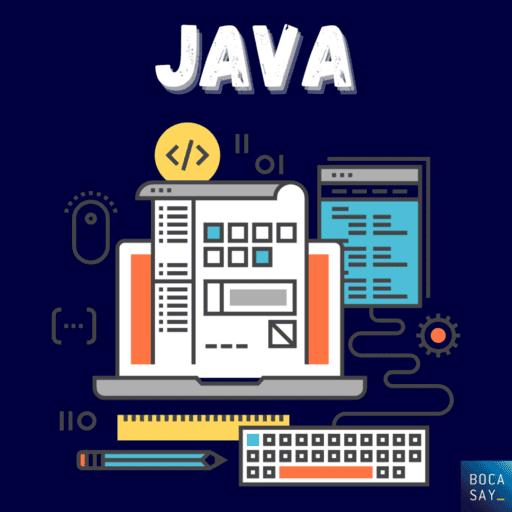What you need to know about the Java programming language
Smartphones and tablets have become an integral part of our lives, by enabling us to communicate, work, travel and instantly pay for products online, without leaving the house.
Wondering what kind of computer science makes all this amazing digital technology possible? The simple answer is a high-level and versatile computer programming language called Java.
In this article, we’ll explore the origins of Java, analyze its importance for developers and provide a beginner’s guide for one of the world’s most widely used programming languages.
What is Java?

Java is a general-purpose and object-oriented computer programming language, designed to function across a wide range of digital systems and devices. Java applications are almost everywhere: data centers, websites, laptops, gaming consoles, supercomputers, smartphones and tablets.
Let’s not forget that Java is also a platform. This means that it is essentially a collection of programs that help developers to program and run Java applications efficiently, and across any digital device that has a Java Virtual Machine (JVM) on it.
Apart from being used to develop software for computers and mobile devices, Java is also used to program other electronic hardware devices such as air conditioners, televisions, refrigerators, washing machines and many others.
Most importantly, Java is an open-source programming language that provides a large collection of free coding libraries and tools that essentially reduce time and investment costs for developing software applications.
Java history
Originally called ‘OAK’, the Java programming language was first developed by James Gosling at Sun Microsystems in 1991. It was officially released as ‘Java’ in 1995 and was then subsequently acquired by Oracle.
Establishing platform independence, the creator’s guiding motto was “Write Once, Run Anywhere”. In other words, the point was to be able to write one piece of code which could eventually be compiled to run properly on any device.
Ahead of its time in the mid 1990’s, the language had been developed by programmers who were already imagining a world of digitally interconnected devices, what we would now call the Internet of Things (IoT).
Why is Java a great first coding language for beginners?
Java is considered to be particularly well-suited to those who are getting into computer programming for the first time.
Well-Established: Java has been with us for a very long time and that means it is a well-established computer programming language with an abundance of learning resources, both in books and online education platforms.
Easy-Mentoring: As mentioned above, there are probably more programmers using the Java language than any other coding language in the world. It’s very easy to find an experienced programmer to mentor your learning process.
Skill Versatility: Java’s language syntax derives from C, another important programming language. As other languages were also derived from C, it means that if you start with Java, learning how to code with other languages is much easier.
🌍 Do you have an IT project that could benefit from Java software development? At Bocasay, our dedicated teams of developers empower companies with smart IT solutions around the world. Contact us to find out how we can help with your next project 🌍
Why is Java Important for Developers?
The Java programming language is very popular among software developers precisely because of its wide range of potential applications:
Enterprise Software: Even after decades of competition, Java is the go-to programming language for building large-scale enterprise applications that cater to the needs of corporate environments, and drastically improve business operations in one way or another. With companies like Google and Amazon using Java, this coding language has become a crucial part of most IT infrastructure systems. Since enterprise software has to be scalable, Java provides unparalleled enterprise scalability because it is platform-independent.
Android Apps: Widely used for building robust, secure and adaptable android applications, Java is a leader in mobile app development. Its success rests on a combination of stability, reliability, ease-of-use, cross platform development capacity, as well as security. By focusing on early testing for software bugs and errors, Java app development is a cost effective method that enables the building of high-performance android apps without the need for a high initial investment.
Big Data: Any software developer considering a career in big data projects will probably start by learning how to code in Java. The wide availability of open-source tools and libraries within Java programming environments provide accessibility, data integrity and most importantly scalability. As big data projects commonly interact with huge amounts of data, and are designed with upscaling in mind, Java is the perfect IT solution for designing complex big data infrastructure.
Scientific Computing: Java’s powerful features and versatility can support the development of scientific applications. The programming language provides a fast, secure and mobile environment in which complex scientific calculations and mathematical operations can take place. It is no surprise that Java-powered applications are widely used within academic research, medical science and the aerospace industries. For example, MATLAB (Mathematical Laboratory), is one of the most popular scientific applications that uses Java.
Embedded Systems: Devices like smart TVs, utility meters and multimedia systems found in cars are all examples of embedded systems that use Java technology. An embedded system is basically a combination of many small programmed computing units that perform dedicated functions together, as part of a larger integrated IT system. It’s always important to remember that Java was originally invented with a purpose of developing embedded systems with functional programing for a wide range of hardware devices.